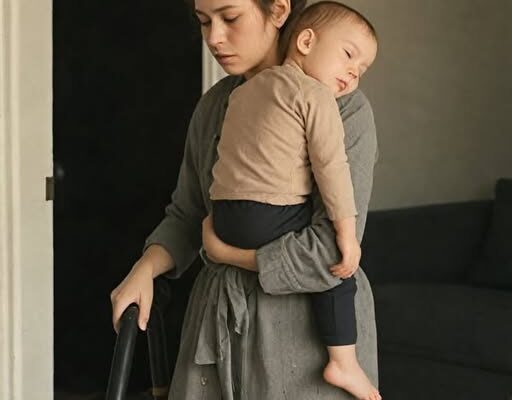My 7-year-old son, who had always been polite and kind, suddenly changed. He started yelling at me, refusing to listen, and going out of his way to act out—knocking over flower pots, tearing up his notebooks, throwing trash around his room just to make a point. I told myself it was just a phase.
But as weeks turned into months, things only got worse. One night, after I had tucked him into bed, I was passing by his room on the way to the bathroom when I heard him speaking to someone.
I stopped, heart pounding, and pressed my ear to the door. That’s when I understood why he changed so much! He said: “I hate her, Dad. She’s the reason you’re gone.”
I stood there frozen. It was like someone had punched all the air out of my lungs. My ex-husband had been whispering poison into our son’s ears, blaming me for everything that went wrong between us.
I knew our divorce had hit my son hard, but I hadn’t expected this. I hadn’t expected him to believe that I had destroyed our family.
The next morning, I tried to talk to him. I made him pancakes, his favorite, and sat down across from him at the table. I said, as gently as I could, “Do you want to talk to me about anything?”
He barely looked up. “No.”
“Anything about Dad?” I asked, carefully.
That’s when he looked at me, his eyes full of something I hadn’t seen before—coldness. “He said you didn’t love him anymore. That you wanted someone else.”
I nearly dropped my fork. “That’s not true,” I said quickly. “Sometimes grown-ups… we stop getting along. But that doesn’t mean I stopped loving your dad. And it has nothing to do with someone else.”
He didn’t answer. He just pushed his plate away and left the table.
The hardest part was knowing that I couldn’t fight back. I didn’t want to trash his father in front of him. I still believed our son needed both of us, even if we couldn’t be together.
I tried getting him into therapy, but my ex wouldn’t sign the paperwork. I tried getting a mediator to help us co-parent, but every time we met, it turned into another argument.
And all the while, my son kept drifting further from me.

One day, after he came back from a weekend with his dad, I noticed his backpack was stuffed with snacks and toys I hadn’t bought. There was even a little video game console—something I’d said we couldn’t afford right now.
I asked where he got it. He grinned. “Dad says I can have whatever I want. Because he listens.”
I nodded, trying not to cry. How could I compete with that?
Over time, I stopped asking questions. It felt like everything I said just made him hate me more. My days started to revolve around keeping the peace. I walked on eggshells around my own child.
Then one afternoon, I got a call from his teacher.
“He’s been acting out in class,” she said. “And… he told a classmate that you hit him.”
I almost dropped the phone.
“I what?”
“I don’t want to assume anything,” she said quickly. “But we’re required to report it if a child says something like that.”
I hung up and sat on the floor, shaking. I had never laid a hand on my son. Not once.
The next day, a social worker showed up at my door.
I went through the motions. They looked through the house, checked for signs of abuse, interviewed my son privately. He told them I yelled and made him cry. That I was “always mad.”
When they left, they said they didn’t see any evidence of physical abuse, but they’d keep a file open.
I felt like I was drowning. And I didn’t know how to swim anymore.
That night, after I put him to bed, I sat on the couch and cried. Then I picked up my phone and texted my ex.
Me: “Please. Whatever you’re saying to him, please stop. You’re hurting him. And me.”
Him: “I’m not doing anything. Maybe look in the mirror.”
I stared at that message for a long time.
Then I did something I hadn’t done in months. I called my sister.
Her name is Ilinca, and we’ve always been close, but she lives in another city and has three kids of her own. I hadn’t wanted to burden her.
She drove down the next weekend.
She spent time with my son, took him out for ice cream, asked him gentle questions. When she came back, she looked shaken.
“He’s not okay,” she said. “He thinks you made his dad leave. He thinks you’re trying to replace him. He told me you scream at night when no one’s watching.”
I blinked. “I don’t.”
“I believe you,” she said. “But someone’s filling his head. And it’s not just confusion. It’s intentional.”
Ilinca stayed a few more days. One evening, when my son was watching cartoons in the next room, she pulled me aside and said, “Do you have a lawyer?”
I shook my head.
“You need one.”
I didn’t want a custody battle. I didn’t want to fight in court. But I also couldn’t keep living like this—being hated in my own home.
So I found a lawyer. We started documenting everything—texts, school reports, the CPS visit. My lawyer advised me to record any exchanges with my ex, as long as the law allowed it.
It felt awful. Like setting up traps for the person I used to love.
But then something happened that made it all worth it.
One Sunday, my son came back from his dad’s house… crying.
He ran to his room and slammed the door.
I followed, cautiously. “What happened?”
He didn’t answer at first. But later, during dinner, he looked up and said, “Dad got mad. Really mad. Because I called you ‘Mommy’ and not ‘her’.”
I blinked. “He… what?”
“He said you didn’t deserve that name.”
My hands trembled.
That was the moment something shifted in my son. Maybe he saw something that cracked the illusion. Maybe he realized that love doesn’t come with conditions.
From that point on, things began to thaw between us.
It was slow—like watching snow melt in early spring. He’d let me read to him again at night. He’d accept hugs without flinching. He even laughed at one of my silly jokes during dinner.
I didn’t push. I just kept showing up. Every day.
But the real turning point came one afternoon when I picked him up from school.
He climbed into the car and handed me a drawing. It was stick figures—me and him—holding hands. There were two speech bubbles. Mine said, “I love you.” His said, “I love you too.”
I stared at it for a long time, not even realizing I was crying until he said, “Don’t cry, Mommy. I drew it ‘cause I mean it.”
That night, I tucked him in and kissed his forehead. I whispered, “You’re my whole heart.”
He smiled. “I know. You always were.”
The months that followed weren’t perfect, but they were better. I found a counselor who specialized in co-parenting conflicts and child alienation. I kept records, attended every school meeting, and stayed present—even on the days it was hard.
Eventually, my lawyer presented enough evidence to petition the court for a change in our custody agreement. The judge granted me primary custody with monitored visitation for my ex.
My ex fought it, of course. But the tide had turned.
One day, while we were walking in the park, my son turned to me and asked, “Mom… why did you and Dad break up?”
I knelt down and said, “Because we weren’t kind to each other anymore. And when love starts hurting more than helping, sometimes the best thing you can do is let go.”
He thought about that. Then nodded. “I’m glad you didn’t stop being kind to me.”
I smiled. “Never. Not even for a second.”
And now, a year later, he’s back to being my curious, funny, slightly messy little boy. He draws comics, asks too many questions, and occasionally tries to hide broccoli under his napkin.
But most of all, he loves me again. Freely. Fully.
If there’s one thing I learned, it’s this—sometimes love is quiet. It’s not about grand gestures. It’s about showing up every day, even when it hurts. Even when they push you away.
Because eventually, when the storm clears, they’ll remember who stood in the rain with them.
If this story touched you, share it with someone who might need it. And don’t forget to like—it helps more people find stories that matter.


